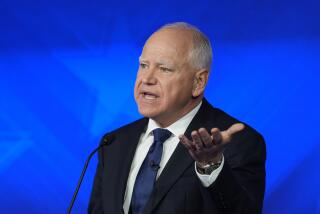Good First Step for China
- Share via
The weekend’s unprecedented human rights debate between President Clinton and Chinese President Jiang Zemin put their summit on the right side of history. The sharp public exchange on political issues virtually taboo in China was broadcast live to a country long accustomed to censorship of political dialogue. The subsequent broadcast of Clinton’s speech at Beijing University and his question-and-answer session with students also provided unedited American views to a Chinese audience. Credit goes to Jiang, who apparently is feeling confident enough in his own position--and with Clinton--to have allowed some debate in the broadcasts.
In the Saturday debate, at a news conference just off Tiananmen Square, Clinton directly criticized Chinese human rights practices. Speaking of the 1989 military crackdown on pro-democracy demonstrators in the square, Clinton declared that the “use of force and the tragic loss of life was wrong.”
President Zemin justified the action, saying, “ . . . had the Chinese government not taken the resolute measures, then we could not have enjoyed the stability we are enjoying today.” The White House was clearly committed to pulling no punches on this pivotal trip for America’s China policy. Clinton raised the issues of religious freedom and Tibet at the news conference and endorsed “universal rights” in his speech at Beijing University. Clinton is now in Shanghai.
The effect of his remarks in spurring further dialogue within China is unclear, but surely no American president visiting China has had the podium that Clinton has. It is not known how many in the potential audience of 800 million Chinese citizens heard the unedited broadcasts, but the gist of the remarks seems certain to travel widely.
The Tiananmen Square massacre has put indisputable limits on U.S.-Sino relations. Jiang broke China’s nine-year public silence about the tragedy, perhaps recognizing that his leadership would be limited if China continued to avoid a candid and public acknowledgment of its differences with the United States. The country faces daunting social changes and instability even without stress in foreign relations.
Though Jiang largely controlled the levers for Clinton’s visit--the broadcasts, the participants--China did take a step forward in access and frankness. Clinton helped. He did not lecture or scold but eloquently set forth American principles. It was a good first step, and others should follow.
More to Read
Sign up for Essential California
The most important California stories and recommendations in your inbox every morning.
You may occasionally receive promotional content from the Los Angeles Times.













